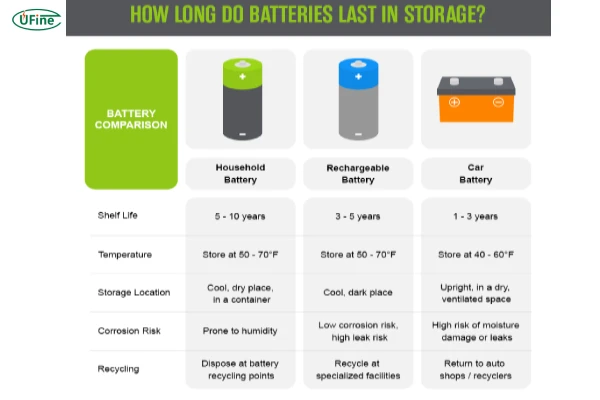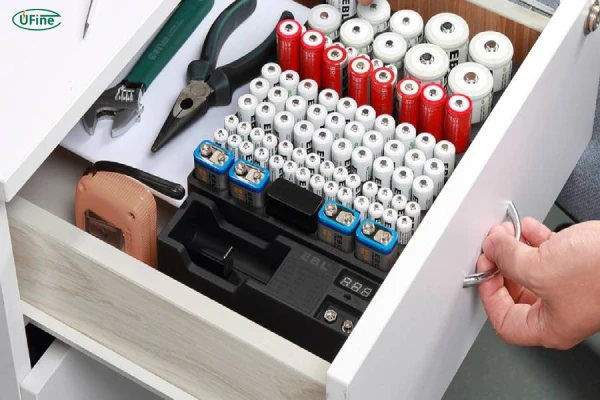Batteries power our everyday lives, from remote controls to electric vehicles. But improper storage can lead to power loss, leakage, or even safety hazards.
How should you store different types of batteries? Should you keep them in their original packaging? And can you leave them inside a device when not in use?
This guide will answer all these questions. We’ll cover battery storage tips, safety precautions, and the best storage conditions for different types of batteries.
For those looking for custom battery solutions, Ufine Battery specializes in lithium-ion, lithium polymer, LiFePO4, and custom-shaped batteries. Contact Us for high-quality, tailored battery solutions!
Part 1. How long can batteries be stored?

Shelf Life of Different Batteries
Batteries do not last forever, even when unused. Each type has a different shelf life, which is the maximum time it can be stored before losing performance.
Battery Type Shelf Life (Unopened & Stored Properly) Do They Lose Power Over Time? Alkaline Batteries 5-10 years Yes, slowly discharges over time Lithium-ion Batteries 2-5 years Yes, loses about 5-10% per year NiMH (Nickel-Metal Hydride) 3-5 years Yes, high self-discharge rate LiFePO4 Batteries 10+ years Very low self-discharge Lead-Acid (SLI) Batteries 6 months – 1 year Loses charge quickly if not maintained
Why can’t batteries be stored indefinitely?
- Self-discharge: All batteries slowly lose charge over time, even if not in use.
- Chemical aging: Battery materials degrade, affecting capacity and performance.
- Storage conditions: Heat, humidity, and incorrect storage speeds up degradation.
To maximize shelf life, store batteries in a cool, dry place and follow the best storage practices for each type.
Part 2. Best way to store different types of batteries
Alkaline Batteries
- Store at room temperature (15-25°C or 59-77°F).
- Keep in a dry location away from moisture.
- Avoid direct sunlight and extreme heat.
- Do not store them loose in a drawer with metal objects (risk of short-circuiting).
Lithium-Ion (Li-ion) Batteries
- Store at 40-60% charge to prevent deep discharge.
- Keep away from extreme heat or cold.
- Use fireproof battery storage bags for added safety.
- If storing for months, check the voltage every 2-3 months.
Nickel-Metal Hydride (NiMH) Batteries
- Store fully charged to prevent deep discharge.
- Keep in a cool, dry place.
- Recharge every 3-6 months to maintain performance.
LiFePO4 Batteries
- Store at 50-70% charge for long-term storage.
- Keep away from direct sunlight and extreme temperatures.
- Check voltage periodically if stored for extended periods.
SLI (Starting, Lighting, Ignition) Batteries
- Store fully charged to prevent sulfation.
- Keep in a cool, ventilated area.
- Charge every 1-3 months if not in use.
For high-quality customized batteries, Ufine Battery offers various lithium and LiFePO4 battery solutions for different applications. Contact Ufine Battery for tailored battery solutions!
Part 3. How to store rechargeable batteries safely?
Rechargeable batteries require special care to maintain their lifespan and efficiency. Here are the key storage tips:
- Store at Partial Charge
- Lithium-ion: 40-60% charge
- NiMH: Fully charged
- LiFePO4: 50-70% charge
- Avoid Extreme Temperatures
- Do not store in a hot car or near heaters.
- Cold temperatures can reduce capacity but won’t cause permanent damage.
- Use a Fireproof Battery Case
- For safety, keep high-energy batteries in a LiPo-safe bag or metal container.
- Check Batteries Every Few Months
- If in storage for a long time, check the voltage and recharge if necessary.
Part 4. Properly organizing loose batteries
Loose batteries can be dangerous if stored improperly. Here’s how to organize them safely:
- Use a battery organizer: Prevents accidental contact between terminals.
- Separate different battery types: Mixing alkaline, lithium, and NiMH can cause leaks or short circuits.
- Store away from metal objects: Coins, keys, and wires can cause accidental discharge.
Part 5. Types of battery storage boxes: are they worth it?
Battery storage boxes protect batteries from damage, moisture, and short-circuiting. Here are the common types:
- Plastic Battery Cases – Affordable, lightweight, and good for small household batteries.
- Fireproof LiPo Bags – Essential for storing lithium-ion or LiPo batteries safely.
- Metal Storage Boxes – Offer high protection and prevent fire risks.
- Drawer Battery Organizers – Keep batteries sorted and easily accessible.
A battery storage box is a great investment if you use batteries frequently or store high-energy rechargeable batteries.
Part 6. Can batteries be stored in a device?
No, it’s not recommended to leave batteries in devices that won’t be used for a long time.
- Why?
- Batteries slowly discharge even when the device is off.
- If forgotten, batteries can leak or corrode, damaging the device.
- Rechargeable batteries might go into deep discharge, making them unusable.
Always remove batteries if you won’t use the device for several months.
Part 7. Should batteries be kept in their original packaging?
Yes, keeping batteries in their original packaging helps:
- Prevent accidental short circuits
- Protect from moisture and contaminants
- Keep track of expiration dates
If the packaging is damaged, use a battery case to store them safely.
Part 8. How to store batteries to prevent corrosion?
Corrosion occurs when batteries leak electrolytes, often due to:
- Exposure to moisture
- Extreme heat
- Expired batteries
To prevent corrosion:
- Store batteries in a cool, dry place.
- Keep them away from humid environments like kitchens or basements.
- Check for signs of leakage and dispose of corroded batteries properly.
Part 9. How do I dispose of old or damaged batteries?
Each battery type requires a specific disposal method. Here’s how to safely get rid of old or damaged batteries:
🔋 Alkaline Batteries (AA, AAA, C, D, 9V)
- Some places allow disposal in regular trash, but recycling is better.
- Many electronics stores, hardware stores, or waste collection centers accept them.
- Do not burn them—they may explode.
🔋 Lithium-Ion (Li-Ion) & Lithium-Polymer (LiPo) Batteries
- Never throw them in the trash—they are a fire hazard!
- Take them to electronics recycling centers. Many retailers (Best Buy, Home Depot, etc.) have drop-off programs.
- If the battery is swollen or damaged, place it in a fireproof container and contact a hazardous waste facility.
🔋 Nickel-Metal Hydride (NiMH) & Nickel-Cadmium (NiCd) Batteries
- Must be recycled at certified collection points.
- Never dispose of NiCd batteries in household trash, as cadmium is highly toxic.
🔋 Lead-Acid (SLI) Batteries – Car & Motorcycle Batteries
- Return them to an auto parts store or battery retailer. Many stores offer a discount for recycling your old car battery.
- Illegal to throw in trash in most areas due to lead contamination risks.
🔋 Button & Coin Cell Batteries (Hearing Aids, Watches, Medical Devices)
- Many contain mercury or lithium, so they should be taken to battery recycling centers.
- Store them safely until disposal, as they pose a choking hazard to children and pets.
Part 10. FAQs
Is it safe to store different types of batteries together?
No, mixing different battery types (e.g., alkaline, lithium-ion, NiMH) in the same storage container can be dangerous. Some batteries have different voltage levels and chemical compositions, increasing the risk of leakage or short-circuiting.
How should I store batteries if I live in a hot climate?
If you live in a hot area, keep batteries in a temperature-controlled environment. Avoid garages, attics, or areas exposed to direct sunlight. If necessary, use an insulated battery storage box to maintain a stable temperature.
Should I tape the terminals of batteries before storing them?
For high-energy batteries (such as 9V, lithium-ion, or LiPo), it’s a good idea to tape the terminals with non-conductive tape. This prevents accidental short circuits if the terminals touch metal objects.
How do I store button cell batteries safely?
Button cell batteries should be stored in child-proof containers, as they pose a serious choking hazard. Keep them in their original packaging or a sealed battery organizer to prevent accidental ingestion.
Can I store batteries in a plastic bag?
No, loose batteries in a plastic bag can come into contact with each other or metal objects, increasing the risk of short circuits. Instead, use a dedicated battery storage case to keep them organized and protected.
How do I dispose of old or damaged batteries?
Never throw old batteries in regular trash. Instead: Recycle them at designated battery disposal centers. Use battery recycling programs at electronics stores. For lithium-ion and LiPo batteries, discharge them safely before disposal.
Do rechargeable batteries lose capacity if stored too long?
Yes, rechargeable batteries degrade over time, especially if stored with no charge or at full charge for long periods. To maintain capacity, store at partial charge (40-60%) and recharge every few months.
Related Tags:
More Articles

How to Choose the Best Floor Scrubber Battery for Commercial Cleaning?
Selecting the ideal floor scrubber battery ensures a long runtime, rapid charging, and minimal maintenance for efficient commercial cleaning operations.
Battery for Blower vs Battery for Leaf Vacuum: Which One Should You Choose?
Battery for blower vs leaf vacuum—learn the key differences in power, fit, and runtime to choose the right battery for your outdoor tool needs.
How to Choose the Right Battery for Blower?
Choosing the right blower battery? Consider voltage, capacity, chemistry & usage. This guide helps match the best battery for peak performance.
How to Choose the Best Insulated Battery Box for Lithium Batteries?
Choosing the Best Insulated Battery Box for Lithium Batteries? Discover key factors such as size, material, and safety for optimal protection and performance.
7 Critical Elements on a Lithium Battery Shipping Label
What must be on a lithium battery shipping label? Learn 7 key elements to ensure safety, legal compliance, and correct handling across all transport modes.




